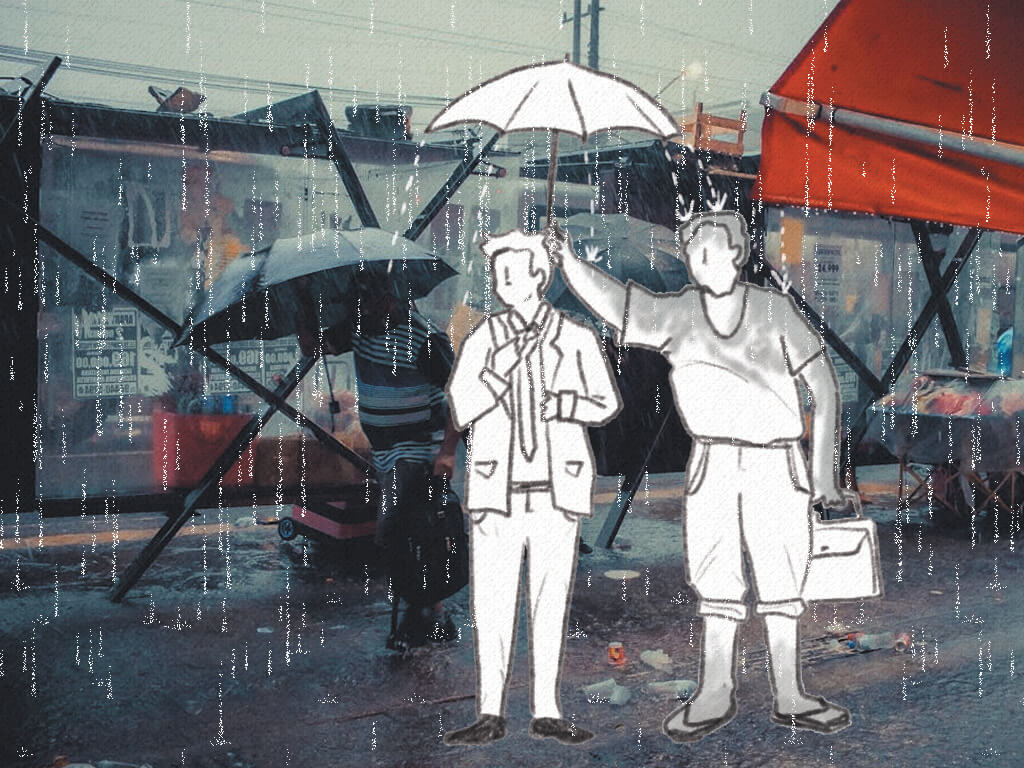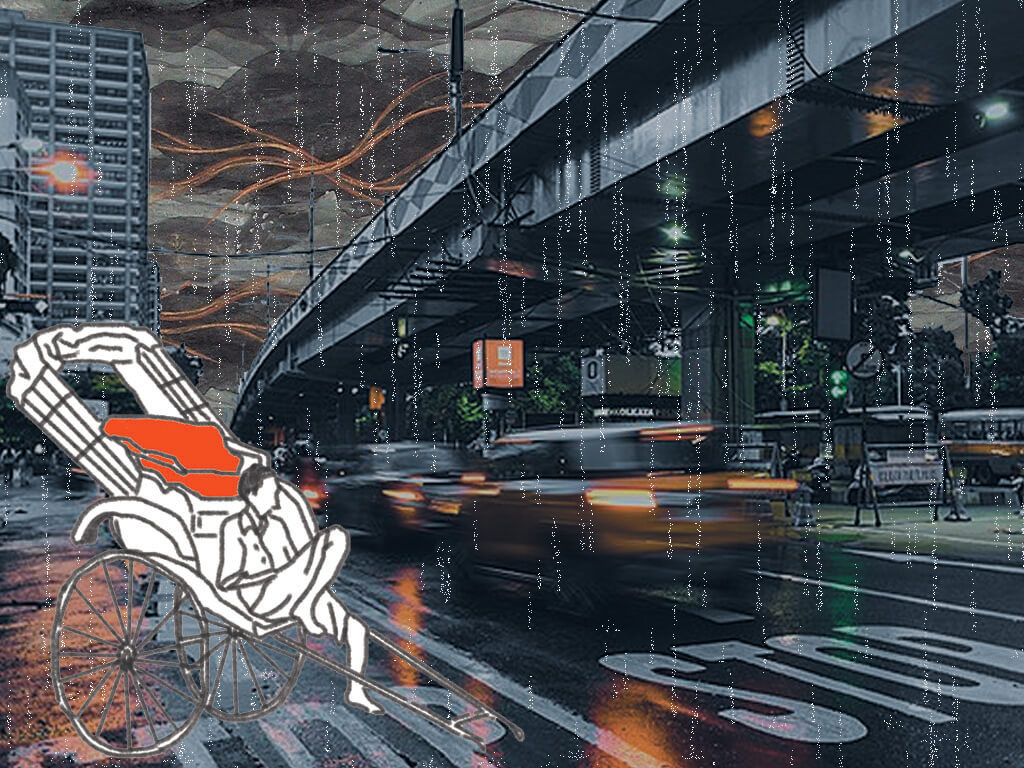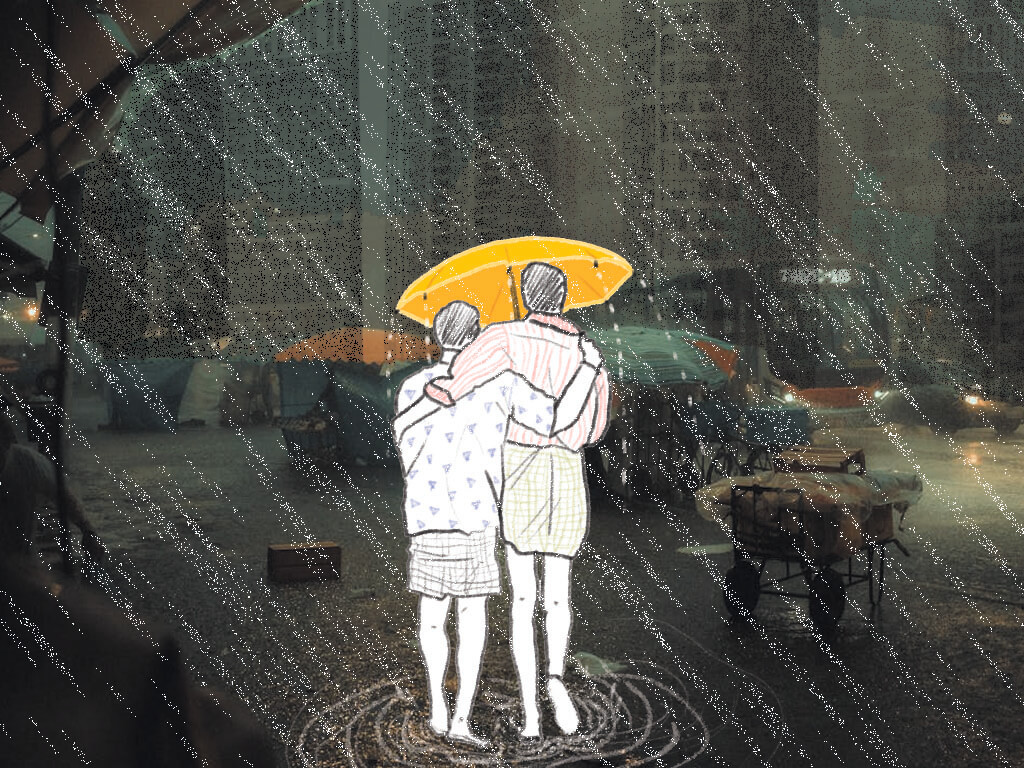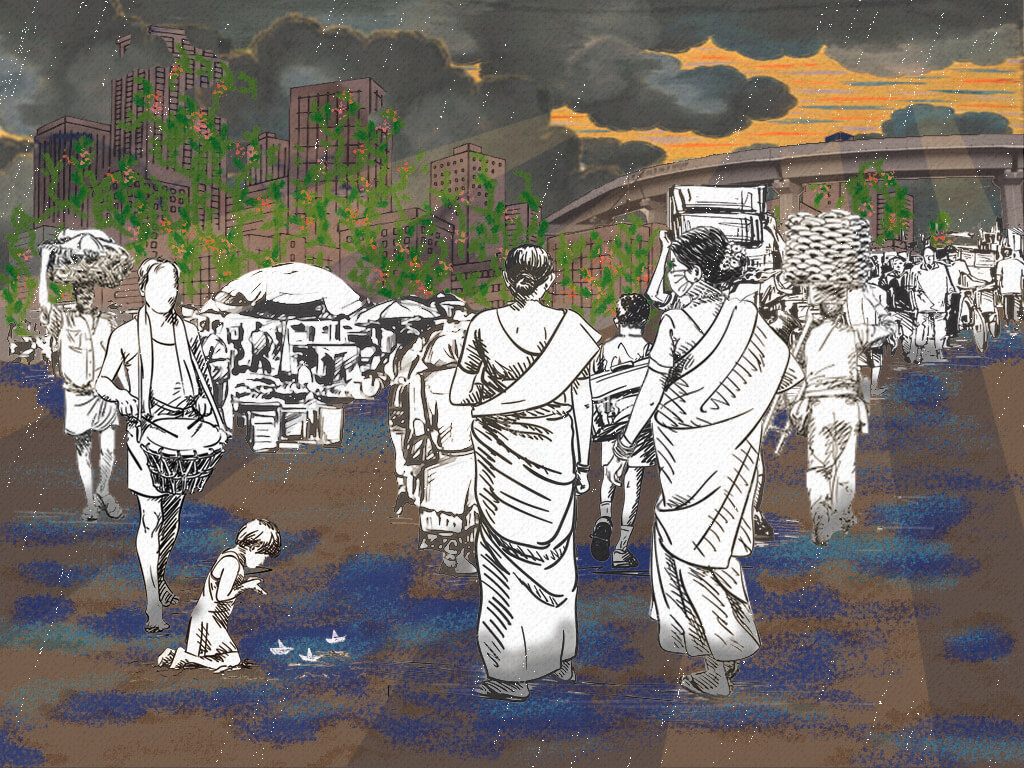We grew up with poems and rhymes around the rains, describing the season as a harbinger of new beginnings, of new life, of childlike joy and more. Rain was all around us in prose and poetry, fables and songs and music pieces. Malhar and many variants of the monsoon raga in Hindustani classical music, Amritavarshini and other ragas in the Carnatic music tradition, renderings in classical dances and folk performances, Frederick Chopin’s Raindrop Prelude and William Shakespeare’s You say you love the rain – all attempt to pen down an exhilarating range of emotions in different forms, mediums and languages.
We ambled along the poetry road to rummage for verses about rain in different languages that capture slices of life in cities. While many celebrated poets, some of them not with us anymore, have composed verse about cities and monsoons, which many of us are familiar with, we reached out to the prolific writer, editor, translator and teacher Sampurna Chattarji and poet Kunjana Parashar to write verses for Question of Cities. While the monsoon in India’s cities often brings them to a halt, exposing their underbellies and mismanaged states, there are other emotions and realities too. We attempted to weave together a collection on different aspects of the monsoon in non-newsy voices.
*****
Which one of us doesn’t have a love-hate relationship with the monsoons? As a writer, I have returned repeatedly to the rains as material for my fiction (Dirty Love which features Bombay’s rains in many stories) and my poetry (Unmappabble Moves in which I wrote, ‘Gather the falling rain in your arms, my sweet, and sing to me’). But the floods that subsume our cities are anything but romantic— they point to such a frightening failure of infrastructure and imagination. And yet, who can deny the romance of the rains? The thrumming of raindrops, so lulling when you are safe and warm and dry indoors (a privilege too few now possess)?
This monsoon, on a request by this journal, I found myself writing two texts—a kind of ‘before/after’ as we held our breath, and waited, and then as we awoke to the first deluge of the season.
MONSOONS: PAST AND PRESENT
That romance is in danger of ending
Under the black umbrella that love song
We sing as we wait for the monsoon to come
/ / /
That waterfall is composed of steps
Where aquatic creatures once leapt
Into our line of vision down escalators of rain
/ / /
That rain tree is composed of leaves
Flowering pink against a greying sky
It does not know the meaning of its name
/ / /
That storm drain waits for the lull
Beneath the choke that clogs its throat
An ancient grief for the rivers that are lost
/ / /
That cloud, in danger of passing
Right over the brow of this coastal city
That wakes thirsty and drenched in sweat
/ / /
That catchment waits to be filled
Short is the fall this time of the year
Dry is the spell we are under
FIRST DELUGE OF THE SEASON
The water log says we are drowning
This ship that is the city of fools
Persisting in our panic buttons as we
Wear our new shoes for the season.
There is no absence as loud as the feeling
That comes with the real rains.
Where the pumps fail the hearts pound
Where the tracks fill the trains stop
It’s business as usual as the trees fall
The roofs cave in and the sewers burst.
Take no notice, you in your towers
Where the light gentles all storms.
Text and poems by Sampurna Chattarji
*****
I call my love for rain violent because of the damage it can cause to lives, livelihoods and property. But I’m also overwhelmed by my love for it, by the beauty it brings. I am easily distracted by snails and earthworms, by the wet squiggle of red taillights on the road in the dark.
I have not attempted to resolve this dilemma of cruelty and beauty or come to a conclusion. Instead, I have turned to rain’s insistence on falling. It feels endless – there’s something both cruel and hopeful about that.
WHAT MANGROVE. WHAT CONCRETE.
It is violent, this love for rain: the hail
and the haul and the pour of it
like the splatter of a thousand bombils
against a puttied drywall. It falls and falls.
Smoggy and clear. Baptising the city’s rot.
Throwing back the debris from the sea’s maw.
It falls over the lonely spines of TMT bars,
over the chawls where blue sheets
of tarpaulin are weighted down by bricks,
over roofs of cars, over crows and pigs.
In the rain, all is porous, all is plain.
What mangrove. What concrete.
Instead, see the dragonflies rise heroic
from marshes, see the backhoe loaders
stuck in the mud, see the tangle of wet root
over wet root, see the skies the colour
of pale mudskippers, hear the night frogs
croaking from the damp around overhead tanks.
It is beyond judgement, this rain. I stand quiet
under its muddy hoof and like a bag of teeth
on tin roofs, it falls and falls.
Text and poem by Kunjana Parashar
*****

بـمـَبـئـي َء جـيِ َبـرسـات
ِهـ َڪ َڇـٽـي َء هـيـٺ
ٽـي ٻـا َر
پـُ َسـنـدا ٽَـھـ َڪ ڏِيـنـدا
پـاڻـي َء جـي َُوهـ ِڪـري
۾ پـيَر پُسـائيـنـدا
وَڃَـن پِـيا
جَـل تَرَنـگـه تـي َنـئـون
راڳـُه!
Bombay rain
Three kids
Under a single umbrella,
Drenched,
Splashing puddles,
Laughing,
moving along
without a care in the world
creating a new symphony.
وسـڪـارو
سَـڄـيِ رات
صُـبـوح جـو
بـالـڪـنـي َء مـان َنـظـارو
’ گـورکـو بـالـٽي پـاڻـيءَ سـان
ڪار ڌوئي
ڪَـپـڙو نِـپـوڙي صـاف ڪـري
َر ِهـيـو آهـي
َمـٿـان َبـرسـات جـاري آهــي.‘
Downpour
Throughout the night…
Scene from the balcony:
A servant
Washing a car
From a water-filled bucket
Trying to dry it
In falling rain!
Poems by Mohan Gehani, translation from Sindhi by Menka Shivdasani
Sindhi, according to the veteran poet, translator and writer Gehani, who has lived through India’s Partition,[1] has a long tradition of poetry and is written in two metric styles. One, based on Persian rules of prosody, is called Wazan Behar and the other based on Indian prosody is called Maatras. The pressures of modern style have meant that the rigorous rules of prosody have been done away with in favour of the form Kavita which has an internal rhythm of its own, and is pithy, striking and symbolic.
*****

The beautiful cities I have lived in – Kolkata, Delhi, now Mumbai – were born of colonial rule. The rain falls on concrete paths, the grass is dead. As I pass by the shoe shops on the Linking Road in Bandra, I wonder where the rain water is going? Is it touching the ground and meeting the salty sea? Can I walk barefoot on a sultry monsoon day waiting for the rain? Yes, rains will come, the dying grass will breathe, trees will come out from the cracks of walls, skywalks, and newly-built flyovers.
Rain! Dark clouds compared to the eyes of a lover in poems, raindrops make love to parched lips as poets would sing. In the harsh city, the homeless man finds shelter under his torn plastic sheet and his wife tucks the small child to her breast as she crawls beside a garbage bin. Is rain desired by all?
Rain is magical, it brings life to life. But our future will not be awakened until an apocalypse comes with torrential rains. A flood. A city destroyed; and a city reborn. I chose Shakti Chattopadhyay’s poem Rain on Kolkata’s Chest that is so evocative.
অজান্তেই বৃষ্টি আসে, টিনের চালায় ফোঁটা ফোঁটা,
ক্ষিপ্ত ঘোড়ার খুরের মতো, ফুলে ফুলে বিছানো রাস্তা।
আবর্জনার ঢিবির নিচে তরল স্রোত; অন্যরকম কালীঝোরা এই,
বয়ে চলেছে বাংলো নয়, কোলকাতার জঘন্য বাড়ি।
বৃষ্টি আসে, গলি জল, ভেসে যায় গল্প, বিছানাপত্র, মাছের আঁশ, খোসা, মধ্যবিত্ত ঘরের
টপ, অযত্ন রাজনীতি, ব্যালট পেপার, কাঠের শুকনো টুকরো, সব। বৃষ্টি এবং বৃষ্টিতে ভিজে পিকনিক করা আবশ্যক; কলকাতার কাছে, মরা ঘাসের কাছেও। এইভাবে জন্মের ঘর, নিমতলা যে ছাই, জীবন, মৃত্যু, এবং অন্যান্য তুচ্ছ জিনিসগুলি বৃষ্টিতে ছড়িয়ে পড়ে। কাপাস তুলা অব্যর্থভাবে সাটিনের কভারের মধ্যে পড়ে থাকে। বৃষ্টি একটু দেরিতে শুতে যায়, কলকাতার বুকে।
Unasked, the rain arrives, the drops beating on tin sheds,
Like furious horse hooves, strewing roads with flowers.
Liquid streams down garbage mounds; a different Kalijhora this,
Flowing not amid bungalows but Kolkata’s hideous homes.
The rain arrives, flooding lanes, washing away
Tales, bedclothes, fish-scales, peels, the torpor
Of middle-class homes, careless politics, ballot papers, dry bits of wood,
All that. Rain and rain-drenched picnics are necessary;
To Kolkata, and also to the dead grass.
Birthing rooms this way, Nimtala ashes that,
Life, death, and other trifles scatter in the rain.
Kapas cotton unfailingly lies down between satin covers.
The rain goes to bed a little late, on Kolkata’s chest.
Text by Gourab Ghosh, poem translation from Bengali by Nandini Gupta[2]
*****
“A City Full of Sirens is a dense interrogation of the city, its sirens of overpopulation, congestion, capitalism and climate change, and an exploration of the fullness or plenitude of language that can somehow soften all of this and make it more bearable for life and time. Firmly rooting this collection is a momentous faith in the capacity of words to resist postmodern fragmentation by building bridges across emotions, cultures, and epistemologies,” describes Basudhara Roy about my book of poems.[3]
Shahar ani Paus is a Marathi poem that conveys what most city-dwellers experience in the monsoon — how a single spell of monsoon brings forth the dysfunctionality of a metropolis otherwise known for its opulence.
A CITY FULL OF SIRENS
On a rain kissed day
sirens from ambulances ring at full volume
sending a shockwave through this somnolence
the city has been suddenly diagnosed with Stage 3C
and all of us who matter to her:
slum dwellers, middle class, uber rich
upper caste, sub-middle-sub-lower, lower,
converts, casteless, outcasts, pimps and city planners
were late by a minimum of ten months in pre-empting this disease
nobody took the city to an oncologist
pointed out this infernal spread
no one bothered when her vitals temporarily shut down
no octogenarian ruins were consulted
when her uterus screamed a history of malfunctioned births
now, water levels are rising
her stomach bloats with a spell of monsoon
and there’s no omental biopsy in sight
no cytology report collected
everyone’s figuring out which part of her abdomen
could be punctured to release the flow
forgetting we had to close the tap, long ago.
the city kept a lot in her womb for far too long
regret and debris
garbage and a festering wound
what she needs isn’t saline and drips
but a memory from the books of sunshine
an embrace from salt lines and mangroves
the reassurance of leafy smiles stretching into infinity
somebody holding her hand, somewhere
she deserves a Sunday with a beginning, middle & end
an unclogging of mind with forests of her childhood
ultimate exculpation from all traffic jams, under construction sites,
illegitimate saat bara* of a river rechristened as a gutter
a forehead filled with deep-rooted kisses
not immigrant, sweat-soaked goodbyes
she needs hope in her veins
laughter under her tissue
maybe, a joke from the past
before she’s sent for chemotherapy
शहर आणि पाऊस
शहराने प्रकाशाचा पदर ओढून
कितीही आपले देह झाकले
तरीही पावसात नागडा होतोच.
रस्त्याच्या कडेला पडलेल्या अनाथ कचरा कुंड्यांमधून
जो उफाळून बाहेर येतो, तो फक्त कचरा नाही
शहराच्या तोंडाला आलेला सफेद फेस
पाऊस पिऊन टाईट
कधीही येतो
घेतो शहराला कोपऱ्यात
शहराचं मनगट आवळतो
पाडतो उताणा
आणि बलात्कार करतो कुठल्याही भीतीशिवाय
मग इतर दिवस
शहर मान खाली घालून चालतं कडेकडेनं
कुठल्याच पोलिस स्टेशनात तक्रार नाही करत
शहराचा आणि पावसाचा असा कुठला करार असावा?
CITY AND MONSOON
Even if the city wraps itself
under the velvet garb of city lights
The monsoon strips it naked, every year.
What festers from every bin at every bend
isn’t just garbage but
Foam from the mouth of the city
The monsoon, arrives
like a drunkard
whisks the city in a corner
Clutches its reluctant wrists
pins it to the ground
rapes it without any fear
Then
the rest of the days
the city walks with its head held low
doesn’t file a complaint with the police, ever.
What kind of an understanding do they both have?
Text and poems by Sanket Mhatre
*****

From a thousand and more poems on monsoon and rains that one may find in Gujarati, I choose a Dalit poet Nirav Patel’s (1950-2019) ‘My share of rain’ from his collection Bahishkrut Phoolo (2017). The poem is devoid of all the romanticism, stock imagery, lyricism, hope, and joy, associated with traditional poems about rain, be it in the cities or in the fields. In the most matter-of-fact tongue, the narrator speaks of the injustices that the climate breeds – a climate fraught with political, religious, cultural contexts, marked by a rural-urban divide, ridden with class-caste-gender inequalities.
Nirav Patel’s poem is not just about monsoon, climate change, drought, and deluge. It asks some of the most pertinent questions about climate justice and water conflicts in our times. For whom does it rain when it rains and whose share of rain is hoarded by whom? Who suffers when it is a ‘hard rain’? And who is left to fend for himself in the end, when the system is more corporate than cooperative in its spirit?
MY SHARE OF RAIN
Is he pleased by elaborate yajnas,
like some corrupt god,
or like some evil saint, is he pleased
by the naked dance of virgin farmer-girls,
busy ploughing the fields after the first rains?
But when he finally arrives, it really rains,
they hide themselves under umbrellas
or roll up their car windows.
Or they set the paper boats afloat
and watch the colourful spectacle of the rainbow.
It is as if, all the benevolence of the rain king
crashes on my head alone,
the lightning, and the thunderstorms, and all.
My hut collapses, tired,
like a camel that has been ferrying all the weight,
and turns into a stream of cow dung and mud
flowing into the flooded farm of Gordhan Mukhi.
The rain is relentless:
Kahniya has gone to graze the village cows
on the shores of the Jamuna,
and in the mid-month of Bhadra
Bhani is washing the clothes
she wears, again and again.
In master’s school, when it rained hard
even a pigeon plucked a peepal leaf
to save the drowning ant!
I too hoped in my heart
that they would come,
like they had at the behest of Lord Varuna,
they will come riding a raft
or wearing magic shoes
and drop a quarter kilogram pack of grain.
But they kept saying ‘hallelujah’ to the floods!
Their altars were flooded, and so were our tanneries,
the high-lying and low-lying areas.
Stealing all the waters from the people
they hoarded the rivers,
the canals, the lakes.
Some sowed waterparks
Some grew aquariums.
Some irrigated paddy fields,
plantations of kamod and jeerasaar
and some ripened sparkling water
by filling it in pouches.
Who knows where my share of rain
fell, in whose field?
Who knows who is harvesting
my share of crops?
Who knows,
the clouds must have burst against
the trees I planted, and it must have poured.
But I am left to endure the ruthless days of drought
with nothing but a fist of corn in my dreams?
Who would’ve known?
મારા ભાગનો વરસાદ
કોને ખબર
લાંચિયા દેવની જેમ તે યજ્ઞયાગથી રીઝે છે
કે લંપટ જોગીની જેમ
હળોતરે જોતરાયેલી
કુંવારી કિસાનકન્યાઓના નવાસ્ત્રા નાચથી?
પણ જ્યારે એ ખરેખર વરસે છે
ત્યારે તેઓ તો છત્રી નીચે જાતને છૂપાવી લે છે
કે કરી કાઢે છે કારના કાચ બંચ.
કે કાગળની હોડીઓ તરતી મૂકી
જુએ છે મેઘધનુષના રંગીન તમાશા.
મેઘરાજાની બધી મહેર જાણે તૂટી પડે છે મારા માથે
વીજકડાકા ને વાવાઝોડા સમેત
બોજ વહી વહીને થાકી ગયેલા ઊંટની જેમ
ફસડાઈ પડે છે મારો કૂબો,
ને ગારમાટીનો રેલો બની વહી જાય છે
ગોરધન-મુખીની ખેત-તલાવડીમાં.
મેઘ મંડ્યો છે:
જમના કાંઠે ગામ આખાની ગાયો ચરાવવા કાનિયો ગયો છે
ને ભર્યે ભાદરવે ભાણી પહેરેલાં લૂગડાં ધુએ છે વારાફેરી.
માસ્તરની નિશાળમાં ધોધમાર વરસાદ વરસ્યો’તો
ત્યારે તો તણાતી કીડી માટે
કબૂતરે ય ચૂંટ્યું’તું પીપળાનું પાન!
મને ય હૈયાધારણ
કે વરુણદેવના વધામણે આવ્યા’તા તેમ
તેઓ તરાપે તરતા તરતા
કે પવનપાવડીમાં ઊડીને ય નાખશે પાશેર ધાનનું પડીકું.
પણ તેઓ તો જેજેકાર કરતા રહ્યા જળબંબાકારનો!
એમના યજ્ઞકુંડો ભેળા ઊભરાયા અમારા ચર્મકુંડોય–
ઉપરવાસ ને હેઠવાસ;
એમ લોક આખાનું પાણી લૂંટી લૂંટી
એમણે સંઘરી લીધાં
નદીનાળાં ને નહેરતળાવ.
કોઈએ વાવ્યા વૉટરપાર્ક
તો કોઈએ ઉગાડ્યાં અકવેરિયમ.
કોઈએ સીંચ્યાં કમોદ-જીરાસારનાં ધરૂવાડિયાં
તો કોઈએ પકવ્યા કલદાર પાણીને પાઉચમાં ભરી ભરી.
કોને ખબર મારા ભાગનો વરસાદ
કોના ખેતરમાં વરસતો હશે?
કોને ખબર મારા ભાગની ફસલ
કોણ લણતું હશે?
કોને ખબર વાદળાં તો
મેં વાવેલાં ઝાડવે ઝાપટાઇને વરસી પડ્યાં’તાં
કે મૂઠી મકાઈ વેરી દુકાળિયા દહાડા કાઢવાના
મારા સપને?
કોને ખબર?
Text and poem translated from Gujarati by Pratishtha Pandya
*****
As Mumbai recorded its second-highest rainfall this July in 15 years[4], a comment from my (Shivani’s) grandmother on uni uni rotli (warm warm roti) during lunch reminded me of a childhood rhyme we sing to this day.
આવ રે વરસાદ, ઘેબરીઓ પરસાદ
ઊની ઊની રોટલી ને કારેલાનું શાક
આવ રે વરસાદ, નેવલે પાણી
નઠારી છોકરીને દેડકે તાણી
Aav re varsad loosely translates to inviting dear rain so that all can enjoy warm rotis with a preparation of bitter gourd. A brief line describes the trail of rainwater making its way from the rooftop to the ground (navele paani) before it ends on a humorous line meant to discipline kids by saying, paraphrased, “the naughty girl was taken away by the frog”.
*****
All illustrations by Shivani Dave
Sampurna Chattarji is a writer, editor, translator and teacher. Her twenty-one books include Space Gulliver: Chronicles of an Alien (HarperCollins 2015, 2020), written during her residency at the University of Kent, Canterbury; Dirty Love (Penguin 2013), her short story collection about Bombay/Mumbai; and Future Library (Red Hen Press USA, 2022), an anthology of contemporary Indian writing. Her eleventh poetry title is Unmappable Moves, just out from Mumbai-based indie-press Poetrywala.
Kunjana Parashar is a poet from Mumbai. Her poems have appeared in Poetry Northwest, The Bombay Literary Magazine, The Prose Poem, ASAP|art, What Are Birds?, SWWIM Every Day, Columba, Heavy Feather Review, and elsewhere. She is the recipient of the 2021 Toto Funds the Arts award for poetry and the 2021 Deepankar Khiwani Memorial Prize.
Mohan Gehani is a noted Sindhi scholar, playwright, translator and poet. Born in Karachi (Sind) on January 20, 1938, he has lived through the Partition of India. Gehani, whose first short story appeared in 1955 in Naeen Duniyan, a progressive literary magazine, is the author of numerous books. He played an active role in the successful campaign to introduce Sindhi in the eighth schedule of the Indian Constitution, is the recipient of several awards including the Sahitya Akademi award in 2011. Menka Shivdasani is a well-known Mumbai-based Indian English poet, editor and writer, and the founder of The Poetry Circle.
Gourab Ghosh (he/him/they) is an Assistant Professor of Literature & Cultural Studies at Jyoti Dalal School of Liberal Arts, NMIMS University. He is also a performer and queer rights activist. Shakti Chattopadhyay was a Bengali writer, essayist and poet whose work raised the issue of nature in crisis. He was also the recipient of the Ananda Puraskar and the Sahitya Akademi Award. Nandini Gupta, currently in the Department of Electrical Engineering, Indian Institute of Technology-Kanpur, was a postdoctoral researcher at the Eindhoven University of Technology, the Netherlands, in plasma physics. Her translation of Buddhadeva Bose’s classic memoir Sab Peyechhir Deshe was published in 2019 as The Land Where I Found It All.
Sanket Mhatre’s first book of cross-translated poems, The Coordinates Of Us won the prestigious Raza Foundation Grant at iWrite 2020 in Jaipur Litfest. He has been featured at Kala Ghoda Arts Festival, Jaipur Literature Festival, Glass House Poetry Festival, Vagdevi Litfest, Poet Translating Poets and National Poetry Festival among many others. His poems have appeared in multiple anthologies as well as literary magazines such as Sahitya Akademi’s Indian Literature, The Indian Yearbook 2022, Roi Faineant, Verum Literary Press. His second poetry collection A City Full Of Sirens has been recently published by Hawakal.
Pratishtha Pandya is a published poet working in Gujarati and English. As Senior Editor of People’s Archive of Rural India (PARI), she leads the creative writing section. She is also a member of the PARIBhasha team, and translates and edits stories and verses from and to Gujarati.
Shivani Dave is an architect, writer and illustrator interested in exploring the intersection of architecture and social sciences. After graduating in architecture from Mumbai, and in media from the London School of Journalism, she is applying the fundamentals of architectural research and writing within urban contexts to develop phenomenological ideas about life in cities. She researches, writes and illustrates in Question of Cities.
Jashvitha Dhagey is a multimedia journalist and researcher. A recipient of the Laadli Media Award 2023, she observes and chronicles the multiple interactions between people, between people and power, and society and media. She developed a deep interest in the way cities function, watching Mumbai at work. She holds a post-graduate diploma in Social Communications Media from Sophia Polytechnic.

